Hey guys, it's Scott.
It is Monday, April 15th, and it is full spring here in New York. You can probably hear the birds and such behind me. I'm outside trying to get some fresh air after a long, gray winter. So a quick bit of housekeeping. We're going to do a class in a couple weeks. I'm still deciding on the subject, but I'm thinking about doing something that's like, twist endings. I was thinking about twists. What do you guys think? Let us know in the comments here. I think it'll be a lot of fun. I love a good twist. I've been kind of neck deep in them with Dungeon and a bunch of other things. Thank you, by the way, for all the kind words on that ending. It really, really made my whole week. The work that Hayden did on that book was just unbelievable and it really went incredibly dark for me. It's probably one of the three or four darkest books I've written. So it was a challenge and Hayden just brought it to life in the most twisted and fun way imaginable. So I really appreciated all the kind words.
And we have Dudley Datson and the Forever Machine #1 coming out from Dark Horse this coming Wednesday:

It was a Comixology Originals book that we did in digital format, and now it's coming out in print in a beautiful paper edition from Dark Horse, fantastic publisher. It's oversized, like all those books are. There's sort of two issues in one, and this is our all-ages book. I've never written something that was designed for my 12 year-old when it was written back when he was 11. And he was super into books like Amulet and Class Act, a lot of young adult graphic novels. So Mouse Guard, things like that. So for me, this was really an attempt to kind of play in that zone. It was really different not being able to do a lot of gore and violence and psychological horror and all of that stuff. And I love the book. I'm really proud of it. And it's very, very different for me. And Jamal is just not only a dear, dear friend, but an incredible collaborator and co-creator. So his work is just stunning on this. The backgrounds, the world creation, the character designs, the emotional storytelling, it's just terrific. So I hope you'll check it out.
A couple of things. One, I know there was a lot of chatter over the weekend and end of last week about scripting, about the correct way to script. And I wanted to just kind of chime in really quickly because it's something that's really close to my heart, honestly. For me, when I started in comics, I only did full script. I really only felt comfortable doing very, very, very long descriptive panels that really sort of gave every detail of how I saw a shot. So a full script is sort of like when you do:
Panel one - Very close on Batman's hands as he wraps them around the Joker's neck. We can feel the tension in the sinew of his fingers and all of that stuff. And we can see the veins in Joker's neck tensing.
Panel two - We pull back, a medium shot where we see both of them. It's raining and they're bloody.
It's like that. Marvel style has come to mean a couple different things over the years, the Marvel method. But ultimately what it was when it started was a way that Jack Kirby and Stan Lee worked together where Stan would give Jack an outline that was seven pages of action compressed into one page. It would tell the whole story in a compressed and outlined way. And it would give the emotional cues. It would give sort of the big beats. But it would give Jack room to direct all of it, to design all of it, to pace it out, all of that kind of stuff. And then Stan would go back in and dialogue it after.
There are a lot of variations on that, but if you think of that as kind of the extreme example, almost like if you got on the phone with somebody and walked them through six to seven to eight to nine to ten pages of a story and just said, “and then this happens and this happens and this scene is really tense because of this and so on,” and then let them sort of do it and then went back in and did dialogue after, that's sort of at the far end of the sliding scale. But there are all kinds of hybrid methods in between. And so it's not a binary. It's not, “hey, there's full script and there's Marvel style.” There's everything in between. There's doing full script, but then giving your artists room to kind of completely make up action sequences if that's what they like. There's giving a very intense dialogue so they know exactly what you're going to say, but giving them tons of room on sort of the action beats, meaning not even like, fight action beats, but just the actual action, directorial choreography. There's doing the opposite, giving everything except the dialogue, which you kind of sketch in.
So it's not really, do I do this or do I do that? And the reason I would say you want to search in that whole gray area and on that whole sliding scale is because the goal is to meet in the place where you and your co-creator or artist are going to both give each other the most you can to produce your best work. So for an artist like Greg Capullo, he really loves to know what a scene is about. He loves to know the biggest beats, but he really likes to have room to flex his muscles and move and and to create the story as he goes. The less is better for Greg. So for Greg I would write a full script and then unwrite it i wrote almost full script so I could see it and then back away from that full script and sort of redo it as an outline for Greg because I needed to, at that point in my career, write a full script so i could live in and feel the scene and then I wouldn't give that to him. I'd give him sort of a compressed version of that:
But it took me quite a few months working with him to start to even move towards that. And it was the most valuable lesson in my entire tenure with Greg, honestly and it's something I'm still grateful to him for. And I text him about and joke around. I just texted him yesterday. He taught me how to work with other artists. He taught me how to work with artists as a better writer in comics. So the more flexible you can be, the better. You might meet an artist who really only likes full script. I can name a few of those. I really liked working with Jim Cheung. Jim really liked full script. And then sometimes he would change panels and stuff like that, but he worked off a full script. Other people like a hybrid. Rafael likes a hybrid. Jock likes a hybrid. Francesco I do hybrid for. And certain things I know they like to get full descriptions of. Like for Francesco, he's a horror buff. So he really likes all the grotesquery and the horror beats spelled out.
But other ones that are more emotional dialogue scenes, I can give him the gist of it, what it's about, and he'll kind of fill in the blanks. It requires you talking to your co-creator artist and being like, “what do you like to do? What can I do to give you exactly what you need to shine?” And so that's what I was trying to say. And that's where I really feel the discussion should go. Not about what style is better, what makes a good script, because you have no fucking idea what the relationship is between an artist and a writer on a book. You don't know if they've worked out the entire book already together. I just did that with somebody. They came to my house and we worked out the entire issue over a series of days on a whiteboard. And so you don't know that if you read the script, you'd be like, “God, Scott didn't even put in any descriptors.” That's because we thumbnailed the entire issue in my studio.
So the point I'm trying to make is that you can't judge somebody's writing by their script that you see, because that script is designed, hopefully, if they're working with an artist that they've approached and they've really talked to, in conjunction with what that artist wants, what that co-creator needs. That's the point, is you might see shorthand that you don't know has already been through the ringer with an artist, or that shorthand might be the first attempt and might be exactly what that artist asked them to do. It might be way more descriptive than you think it should be, but that might be something they've already worked out. Maybe the writer says, “listen, I need to do it this way. Can you work off of this?” And the artist is more flexible. But the point is, a script isn't a thing into itself. It's created as a living document with an artist. And so it's a joint effort. It's a collaborative effort. All of it is in comics, and it's one of the great joys of the medium.
So that's all I would say about it, is that to me it's pointless arguing about what makes a good script, what doesn't, what's the right method, what's not the right method. Because everything is created in a bubble that consists of that creative team. So it's about what that creative team needs. And you don't really have a window into that unless the team tells you what's happening in that space and says, “we decided to do this or that.” Anyway, it's close to my heart because it took me a long time to learn that lesson. I wish I had been better when I started with Greg, but I'm very grateful to him for teaching me that aspect of comic book scripting.
Also, I wanted to give a quick update on Wytches. Very, very excited. We got our animation tests and we have our character designs. So we are full underway. I saw the first 30 seconds of animated footage and I'm so, so, so over the moon by what our team is doing. It's just, it's so fucking scary and gross and heartfelt. I love it. I can't wait for you guys to see in 2025. And it got me thinking a lot about animation because I started watching X-Men ‘97, which is fantastic, as everyone knows. I saw what's coming, and I have not watched this seminal episode five yet, but I am aware. But I already love what I've seen just from the pilot.
So for me, it goes back to the thing I've been saying for a while, which is I think that there are a couple spaces that are really about to explode right now. Animation is one that I sincerely believe in. I think that adult animation in particular, or teen to adult animation, is something that hasn't been explored to the degree that it could be. And you have a whole generation of people that have been raised on anime, that have been raised on Pixar, that have been raised on Disney, that have been raised on a bunch of things that lean into the more mature elements of storytelling and visuals. And yet there are only a few shows that are really full-out R-rated or really go for that level of maturity. And I think you're seeing, with the success of X-Men, Blue-Eyed Samurai, Invincible, and comedies like Orion and the Dark, Mitchells vs. the Machines, Spider-Verse, and all of the Chris Miller and Phil Lord stuff, this upswell of animation made for an adult audience with genre elements, with kid-friendly iconography, but that's made for adults as much as it's made for kids. And so Wytches is a big part of that. I see that coming.
And I think at moments like this where you're living through a year where it's really tough in Hollywood. If anyone is looking for a window into that stuff, the strike caused a big delay in production, right? Like things couldn't be written. Actors were on strike. Things couldn't be filmed. And so a big motto out there is ‘Survive Until ‘25’. So right now it feels like there aren't going to be as many shows and movies coming out because there was the strike. So you're living in sort of the time when all the things that should be out are being made. And that means studios are spending money on those things without a huge amount of money coming in from new shows and films because they weren't made, they're being made now. And so in that way, it's a very lean time. And in lean times, I think people are forced to be really creative in spaces that don't have as much cost of vulnerability, right? So comics is a huge one. Animation is another. Animation has sort of the biggest budget in the world because you don't have to go to a location to do anything. It can take risks with its storytelling because there's less consequence and there's tremendous reward in it.
And the truth is, I feel like comics is a place where this is happening also. People keep talking about superheroes being over and streaming being dead so the indie market is collapsing. These are the moments when things get tough on a kind of macro level for the kinds of storytelling that we do in other mediums like movies and TV. The comics remind people as well that the biggest budgets, the biggest imaginative swings happen here, both in indie stuff and in superheroes. This is where the myths get renewed. This is where you find your next favorite immersive story like Saga or The Walking Dead or so many things that now are just in the cultural imagination in different ways. So to me, it's an exciting moment. It's a scary moment for TV/film and for us as well. But these are the moments, also, when we have an opportunity in comics and in animation and mediums like those to take these huge swings. And I just think this is going to be a year like that. I'm very excited to show you what we've been making in animation and to be a big part of this community too with all the stuff we have planned for Best Jackett.
So I hope you have a great week. I have to take a trip out to Los Angeles, so I'm leaving tomorrow and I'll be gone through Thursday doing some work stuff. It'll be fun. I'm actually going to get to meet everybody from the Wytches writers room for the first time. I've met a few people before I met Jeff Howard and I've met Marion Dayre and I've met Harrison Rivers, who’s also a playwright, when he came to New York, but I haven't met a bunch of the other people. So it I'm very, very excited to do that. And a couple of comic things as well. It’ll be fun. And then I'm back. All right, talk to you soon!
S

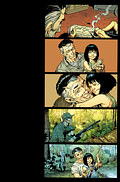




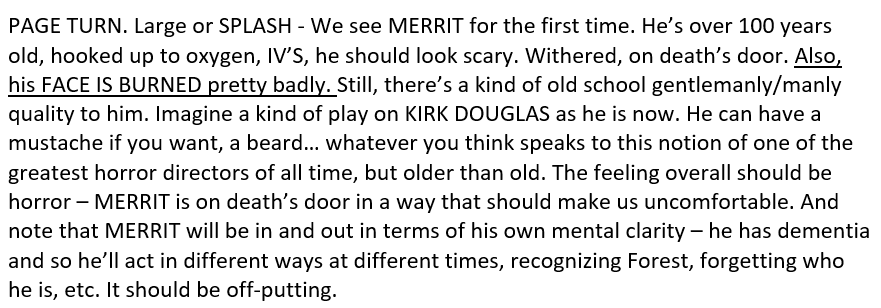



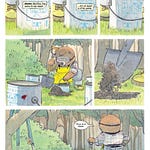


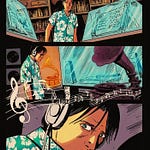
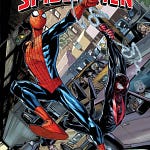
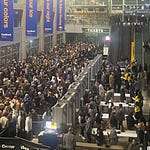
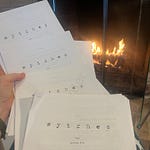

Newsletter #182: Scripting for Artists